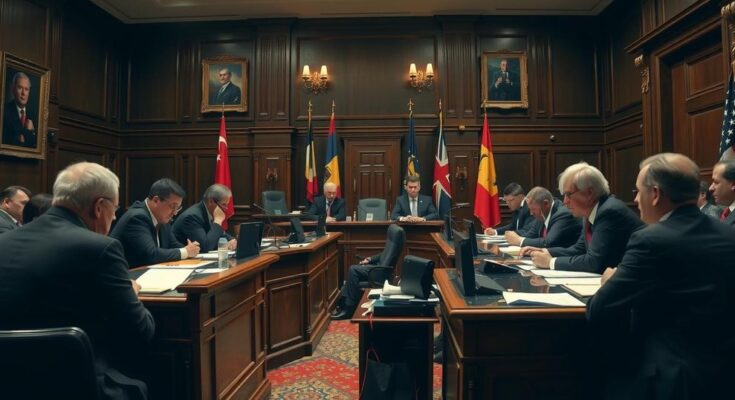Romania’s election bureau may rerun the presidential vote following a court decision on allegations of fraud and foreign influence, particularly from Russia. Călin Georgescu, an ultranationalist candidate, won the initial round but faces scrutiny over his campaign tactics and TikTok’s role. The constitutional court’s ruling, set for today, could significantly impact the public’s trust in Romania’s electoral processes as the country heads toward critical parliamentary elections.
Romania’s election bureau head has suggested that the presidential election’s first round may require a rerun, contingent on a decision by the constitutional court. Toni Greblă indicated that if a rerun is mandated, it could take place on December 15, followed by a second round on December 29. This development comes after the court initiated a recount of the initial vote, originally won by Călin Georgescu, a little-known ultranationalist candidate.
The Romanian presidency reported detection of online interference in the voting process. Officials noted that Călin Georgescu, an independent candidate who previously garnered minimal support, secured a victory aided by extensive visibility on social media platforms, particularly TikTok. The presidency expressed concerns over a rising Russian interest in influencing Romanian societal narratives, alleging that TikTok did not classify Georgescu’s content appropriately.
Georgescu, who ran a campaign without a financial budget and reliant on viral TikTok content, will contend against centre-right candidate Elena Lasconi in an upcoming runoff scheduled for December 8. Amidst accusations from the Romanian presidency regarding TikTok’s role in the election, the platform rebutted claims of preferential treatment towards Georgescu, maintaining that it strictly adheres to guidelines against election misinformation.
With calls for the cessation of the Ukraine conflict, denial of the Covid-19 pandemic’s existence, and controversial statements regarding historical figures, Georgescu’s candidacy has attracted significant attention. A motion to annul his victory, initiated by conservative politician Cristian Terhes, has raised concerns about the integrity of Romania’s electoral processes and the faith of the public in institutional integrity, especially following prior judicial exclusion of another far-right contender. Despite these controversies, parliamentary elections are set to proceed on the upcoming Sunday, poised to impact Romania’s political landscape as a critical EU and NATO ally.
The current political climate in Romania is characterized by a contentious presidential electoral process which has raised serious questions regarding election integrity and external influences. Călin Georgescu’s victory as an ultranationalist candidate, coupled with allegations of foreign meddling and social media manipulation, has drawn scrutiny from both governmental institutions and the public. The role of social media platforms like TikTok in shaping electoral outcomes has emerged as a significant focal point, evidencing the complexities of modern electoral dynamics in the digital age. As the constitutional court deliberates on the potential rerun of the election, the implications for the public’s trust in state institutions remain a pressing concern.
The impending decision from Romania’s constitutional court will critically influence the outcome of the presidential election, underscoring significant concerns regarding electoral integrity amidst allegations of foreign influence and social media manipulation. Călin Georgescu’s unorthodox campaign has raised alarms over the role of digital platforms in politics and their potential to sway election results. As Romania approaches further parliamentary elections, the outcome will be pivotal in shaping the nation’s political trajectory and its position within European and NATO contexts.
Original Source: www.theguardian.com




